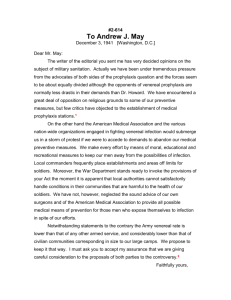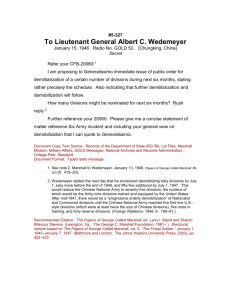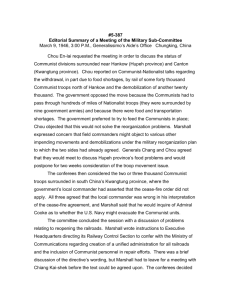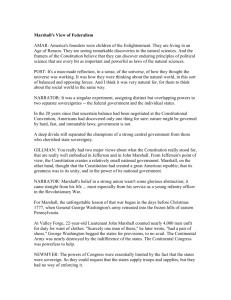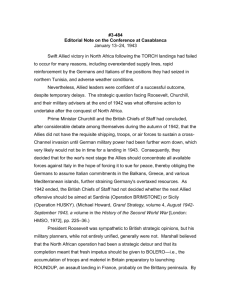5-500 - George C. Marshall Foundation
advertisement
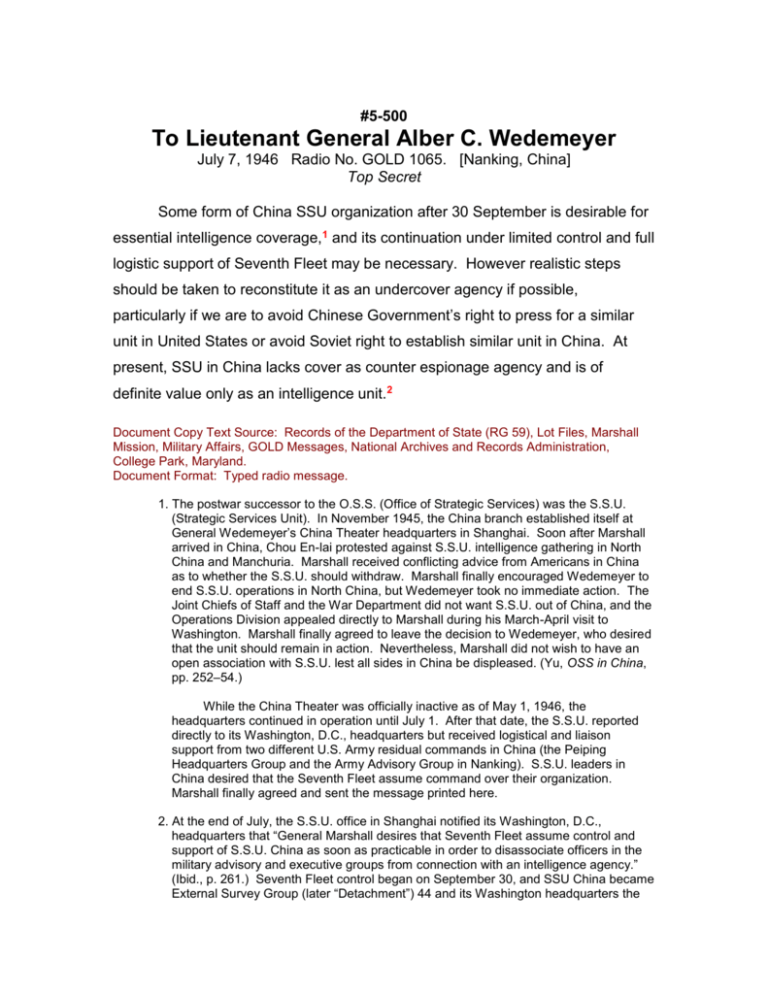
#5-500 To Lieutenant General Alber C. Wedemeyer July 7, 1946 Radio No. GOLD 1065. [Nanking, China] Top Secret Some form of China SSU organization after 30 September is desirable for essential intelligence coverage,1 and its continuation under limited control and full logistic support of Seventh Fleet may be necessary. However realistic steps should be taken to reconstitute it as an undercover agency if possible, particularly if we are to avoid Chinese Government’s right to press for a similar unit in United States or avoid Soviet right to establish similar unit in China. At present, SSU in China lacks cover as counter espionage agency and is of definite value only as an intelligence unit.2 Document Copy Text Source: Records of the Department of State (RG 59), Lot Files, Marshall Mission, Military Affairs, GOLD Messages, National Archives and Records Administration, College Park, Maryland. Document Format: Typed radio message. 1. The postwar successor to the O.S.S. (Office of Strategic Services) was the S.S.U. (Strategic Services Unit). In November 1945, the China branch established itself at General Wedemeyer’s China Theater headquarters in Shanghai. Soon after Marshall arrived in China, Chou En-lai protested against S.S.U. intelligence gathering in North China and Manchuria. Marshall received conflicting advice from Americans in China as to whether the S.S.U. should withdraw. Marshall finally encouraged Wedemeyer to end S.S.U. operations in North China, but Wedemeyer took no immediate action. The Joint Chiefs of Staff and the War Department did not want S.S.U. out of China, and the Operations Division appealed directly to Marshall during his March-April visit to Washington. Marshall finally agreed to leave the decision to Wedemeyer, who desired that the unit should remain in action. Nevertheless, Marshall did not wish to have an open association with S.S.U. lest all sides in China be displeased. (Yu, OSS in China, pp. 252–54.) While the China Theater was officially inactive as of May 1, 1946, the headquarters continued in operation until July 1. After that date, the S.S.U. reported directly to its Washington, D.C., headquarters but received logistical and liaison support from two different U.S. Army residual commands in China (the Peiping Headquarters Group and the Army Advisory Group in Nanking). S.S.U. leaders in China desired that the Seventh Fleet assume command over their organization. Marshall finally agreed and sent the message printed here. 2. At the end of July, the S.S.U. office in Shanghai notified its Washington, D.C., headquarters that “General Marshall desires that Seventh Fleet assume control and support of S.S.U. China as soon as practicable in order to disassociate officers in the military advisory and executive groups from connection with an intelligence agency.” (Ibid., p. 261.) Seventh Fleet control began on September 30, and SSU China became External Survey Group (later “Detachment”) 44 and its Washington headquarters the Central Intelligence Group. (Seventh Fleet to War Department, September 29, 1946, NA/RG 59 [Lot Files, Marshall Mission, Military Affairs, ESD 44].) Recommended Citation: The Papers of George Catlett Marshall, ed. Larry I. Bland and Sharon Ritenour Stevens (Lexington, Va.: The George C. Marshall Foundation, 1981– ). Electronic version based on The Papers of George Catlett Marshall, vol. 5, “The Finest Soldier,” January 1, 1945–January 7, 1947 (Baltimore and London: The Johns Hopkins University Press, 2003), p. 624.

